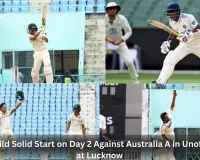Asia Cup 2025: India-Pakistan handshake controversy escalates as Trophy presentation uncertainty looms
Digital Desk
2.jpg)
The Asia Cup 2025 has been overshadowed by a brewing diplomatic crisis following India's decisive seven-wicket victory over Pakistan on Sunday. The controversy began when Indian captain Suryakumar Yadav refused to shake hands with Pakistani counterpart Salman Ali Agha during the toss and continued when Indian players walked straight to their dressing room after the match, declining customary post-match handshakes with Pakistani players.
Background: Pahalgam Terror Attack Connection
The handshake boycott stems from India's response to the Pahalgam terror attack that occurred on April 22, 2025, where terrorists opened fire in the scenic Baisaran valley, killing 26 people, mostly tourists. Following the attack, India launched Operation Sindoor in May, striking terror bases across the border, leading to a tense three-day military standoff between the nuclear powers.
Suryakumar Yadav defended his team's actions, stating: "Perfect occasion, taking the time out - we stand by the families of the victims of the Pahalgam terror attack. We express our solidarity. Want to dedicate the win to all our armed forces who showed a lot of bravery".
BCCI Breaks Silence, Defends Players' Stance
The Board of Control for Cricket in India (BCCI) has finally broken its silence on the controversy, defending the team's decision. A senior BCCI official clarified that handshakes are not mandatory according to cricket's rulebook.
"Look, if you read the rule book, there is no specification about shaking hands with the opposition. It is a goodwill gesture and a sort of convention, not law, that is followed globally across the sporting spectrum," the BCCI official told PTI.
Pakistan Cricket Board Files Formal Complaint
The Pakistan Cricket Board (PCB) has escalated the matter by filing formal complaints with both the Asian Cricket Council (ACC) and the International Cricket Council (ICC). PCB Chairman Mohsin Naqvi, who also serves as ACC President, has demanded the immediate removal of match referee Andy Pycroft from the Asia Cup.
The PCB alleges that Pycroft instructed both captains not to shake hands during the toss, describing this as a violation of the ICC Code of Conduct and the Spirit of Cricket. Pakistan has threatened to boycott their remaining matches if their demands are not met.
ICC Expected to Reject Pakistan's Demands
According to multiple reports, the ICC is likely to reject Pakistan's demand to remove Andy Pycroft as match referee. The 69-year-old former Zimbabwe cricketer has officiated 103 Test matches since 2009, making him one of cricket's most experienced referees.
Sources suggest that Pycroft had minimal involvement in the handshake controversy, and the ICC sees no grounds for his removal.
Trophy Presentation Crisis Looms
The controversy has now extended to potential future encounters, with reports suggesting that if India reaches the Asia Cup final on September 28, the team will refuse to accept the trophy from Mohsin Naqvi, who as ACC President traditionally hands over the winner's trophy.
"It is reliably learnt that if India make the tournament's final on September 28, the players won't be sharing the presentation dais with Naqvi, who is expected to hand over the winner's trophy as ACC head," according to PTI reports.
Potential September 21 Rematch
The tension between the two teams could reignite on September 21, when the top two teams from Group A are scheduled to meet in the Super Four stage. If Pakistan defeats UAE in their upcoming match on September 17, both India and Pakistan will qualify for the Super Four round, setting up another high-stakes encounter.
India currently sits atop Group A with 4 points and a net run rate of +4.793, while Pakistan has 2 points with a +1.649 NRR.
The situation is further complicated by the governance structure of Asian cricket. Mohsin Naqvi heads the ACC while India's Jay Shah leads the ICC. The Asia Cup operates under ACC jurisdiction, but match referees are appointed by the ICC, requiring intervention from the global body for any removals.
This unprecedented controversy has transformed what should have been a celebration of cricket into a diplomatic flashpoint, with implications extending far beyond the cricket field. As the tournament progresses, all eyes will remain on whether these tensions can be resolved or if they will continue to overshadow the sporting spectacle.


.jpg)

.jpg)
.jpg)


1.jpg)
.png)
.png)
